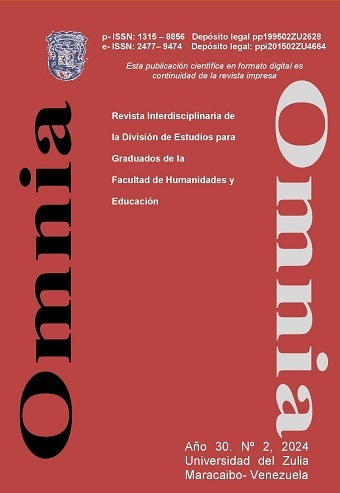A radio production to educate, inform and entertain
Abstract
This text describes the importance of radio production based on López (2005), and the use of the sound code according to Casetti and Di Chio (1991, 1997), characterizing the structure and functions of radio sound and arguing the use of various methods that include convergence on the Internet or cyberradio, based on the principles of Cebrián (2009), and currently with the inclusion of Artificial Intelligence (AI). In this qualitative text, it is reviewed, documented and argued theoretically with the technique of observation and the description of the sound reality with the intention of suggesting methods for radio production in radio stations in Venezuela and Zulia state in particular. It is observed that those who like the radio listen to it to enjoy the sounds, entertain themselves and get information. However, everything indicates that the radio must propose in its production and programming content that distributes the proper use of the word, musical selection appropriate to the time blocks, instead of privileging almost exclusively advertising insertion as opposed to educational messages for its users.
Downloads
References
Casetti, Francesco y di Chio, Federico (1991). Cómo analizar un film. Ediciones Piadós Ibérica S.A. Barcelona.
_______________________ (1997). Análisis de la televisión. Instru-mentos, métodos y prácticas de investigación. Barcelona, Buenos Aires, México.
Cebrián, Mariano (2009). Expansión de la ciberradio. Enlace Revista Venezolana de Información, Tecnología y Conocimiento, 6 (1), 11-23.
Declaración Universal de Derechos Humanos. (Documento en línea) Dis-ponible en: https://www.un.org
Eco, Umberto (1972). La Estructura ausente. Introducción a la semiótica. Editorial Lumen. Barcelona-España.
___________ (1976). Tratado de Semiótica General. Traducción de Carlos Manzano. Editorial Lumen, S.A. Barcelona-España.
Isdigital (2021). Inteligencia artificial y clonación de voz: ejemplos y usos de un futuro que ya está aquí y que escuelas como ISDI enseñan en sus aulas. Disponible en: mub.me/3Lls. (Consulta: 2023, junio 27).
López, José (2008). Ciudadana radio. El poder del periodismo de inter-mediación. Ministerio de Comunicación e Información. Caracas-Venezuela.
_________ (2005). Manual urgente para radialistas apasionadas y apasionados. Tomos I, II, III, IV y V. Ministerio de Comunicación e Información. Caracas-Venezuela.
Prieto, Iris.; Durante, Esther (2007). La evolución de la radio y las impli-caciones tecno-socio-culturales en la audiencia: De oyente a usua-rio en la recepción del mensaje. Espacio Abierto. 16 (2) 313-329.
Serrano, Martín (1993). La producción social de comunicación. Alianza Editorial S.A. Madrid.
Villalobos, Orlando (2007). Comunicación y ciudadanía. La creación del tejido social de Maracaibo. Colección de textos universitarios de LUZ. Producciones Editoriales C.A. Mérida.





